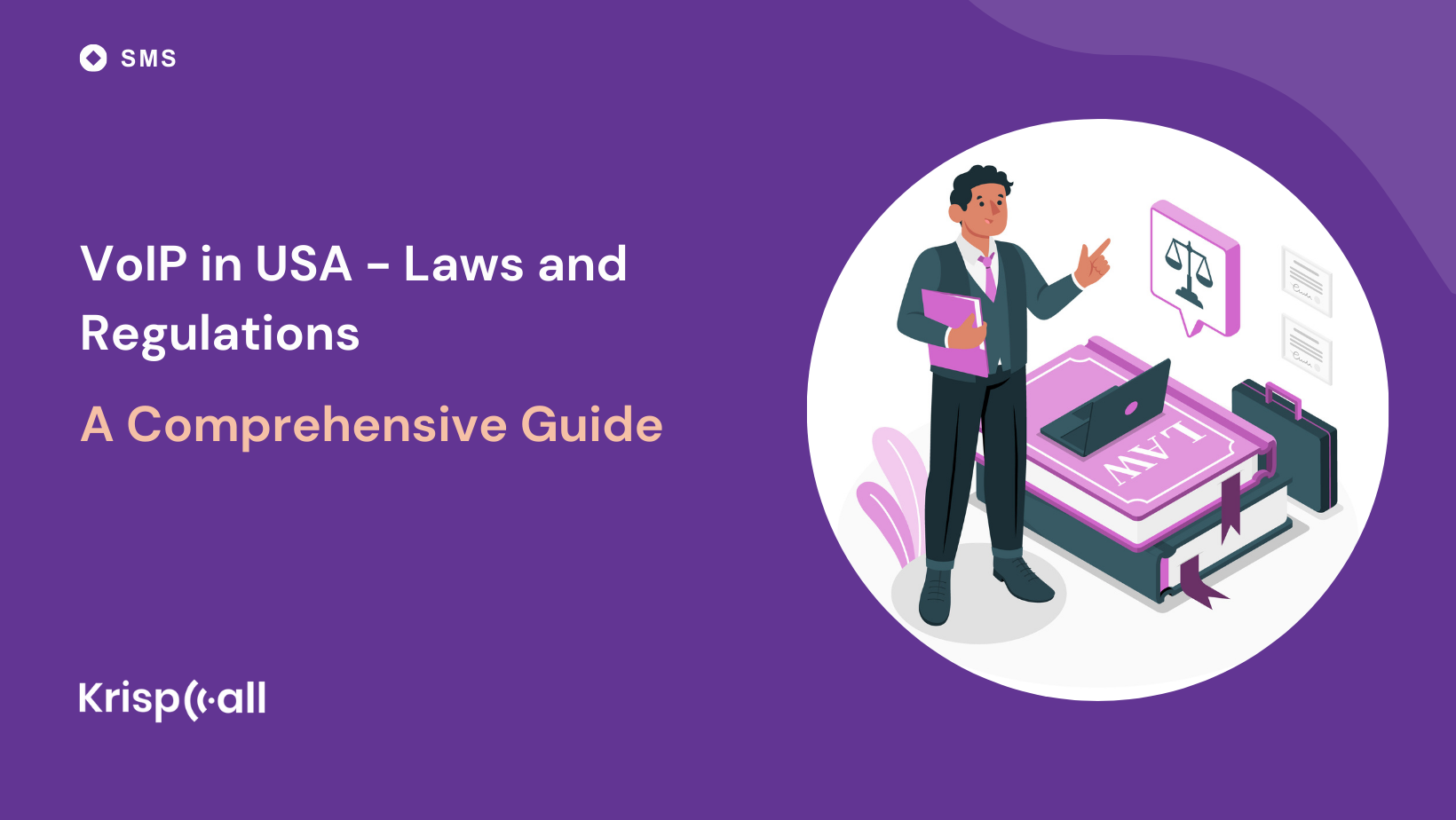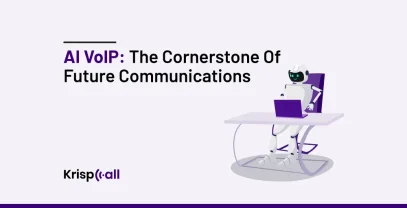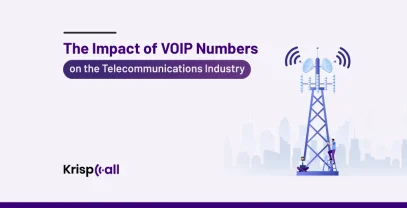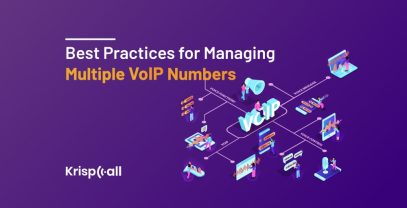In today’s digital world, VoIP has transformed how we talk to our 👪 friends, family, and businesses. However, did you know that numerous complicated laws regulate this technology?
The Federal Communications Commission (FCC) is the authority that creates the regulatory framework for the PSTN (public switched telephone network) and VoIP telephony in the United States. But don’t worry; we are here to help you 😌understand them in an informative manner.
This guide will give you an overview of VoIP compliance in the USA, including the legislation and regulations.
🔑 KEY HIGHLIGHTS
- The FCC divides VoIP service provisions into two fundamental divisions: Interconnected VoIP services and Non-interconnected VoIP services.
- The FCC guidelines for interconnected VoIP include protection of Customer Proprietary Network Information (CPNI), Emergency Services (911), Number Portability, Disability Access (CVAA), and Universal Service fund contributions.
- Customer protection, service quality, regulatory compliance, and accessibility requirements are the FCC guidelines for Non-Interconnected VoIP.
- HIPPA, Health Insurance Portability and Accountability Act is a federal law that protects sensitive patient health information.
- KrispCall is one of the leading VoIP solutions in the United States. It solves modern problems and offers numerous useful options for home and business use.
What is VoIP?
Voice over Internet Protocol, or VoIP, is a technology for communicating and conducting audio and video calls over the Internet. In other words, it lets users use the Internet connection to make phone calls instead of traditional landlines.
In the United States, VoIP is regulated by several laws and regulations, mostly managed by the Federal Communications Commission. The FCC divides VoIP services provision into two fundamental divisions. These are Interconnected VoIP services and Non-interconnected VoIP services.
Interconnected VoIP services require users to make and receive calls from and to a Public Switched Telephone Network, while non-interconnected services do not.
FCC Core Regulations for Interconnected VoIP
Interconnected VoIP services enable customers to place and receive calls to and from the Public Switched Telephone Network (PSTN). The FCC regulations for interconnected VoIP services address the following important areas:
Privacy and Customer Proprietary Network Information (CPNI) Protection
Customer Proprietary Network Information, also known as CPNI Protection, protects the components of sensitive information of subscribers gathered by telecommunication service providers about the individual’s telephone communications. CPNI guidelines, regulated by the commission, restrict any distribution of CPNI information from carriers, except with the approval of the users, which necessitates appropriate identification to reveal the information and prohibit the selling or unfounded revelation of the same.
Emergency Services (911)
One crucial aspect of FCC regulations regarding interconnected VoIP services revolves around guaranteeing smooth integration with emergency services. The FCC requires VoIP providers to make sure that if you dial 911, your call gets through to the right emergency center. This helps make sure that if you ever need help, emergency services can find you quickly, even if you’re using an internet-based phone service instead of a regular landline.
Number Portability
FCC has regulations related to number portability, which mandates interconnected VoIP providers to enable consumers to keep their phone numbers when they shift among different VoIP service providers. VoIP providers must act to the best of their ability to enable consumers to maintain an uninterrupted connection when transferring between VoIP providers and making providers’ selections. Number portability facilitates consumer choice, promotes further competition, and increases optionality.
Disability Access (CVAA)
Interconnected VoIP providers are required to operate in compliance with the 21st-century Communications and Video Accessibility Act to ensure that persons with disabilities can access their services.
Universal Service Fund Contributions
FCC has regulations related to Universal Service Fund contributions. It requires all VoIP providers in the United States to register, file regular reports, and contribute a percentage of their interstate and global consumer earnings to the Universal Service Fund, with the contribution rate adjusted quarterly.
FCC Guidelines for Non-Interconnected VoIP
Non-interconnected VoIP services, commonly termed peer-to-peer VoIP, allow users to communicate by voice over the internet in real-time. Unlike interconnected VoIP, non-interconnected VoIP does not make connections to the traditional service of the Public Switched Telephone Network on both ends of a call between a traditional telephone and a VoIP user.
Non-interconnected VoIP services connect either on the PSTN, either the origination or termination, but not both, or they don’t connect to the PSTN at all.
Here are the key areas covered by the FCC regulations for non-interconnected VoIP services:
Consumer Protection
Guidelines provided by the FCC for non-interconnected VoIP services are designed to ensure adequate customer protection and regulatory compliance. The regulations are described below:
- Fair and transparent billing: Providers must ensure that billing practices are clear and transparent, providing customers with detailed breakdowns of charges and fees. Transparent billing helps consumers understand the costs associated with the service and prevents misunderstandings or disputes.
- Clear terms of service: Customers must be provided with clear and concise terms of service outlining their rights and responsibilities regarding the VoIP service. This includes information about acceptable use policies, service features, and dispute resolution procedures.
- Data privacy protections: Robust data privacy measures are essential to protect consumer information from unauthorized access or disclosure. Providers must implement encryption access controls and comply with relevant privacy regulations to safeguard customer data and maintain trust in their services.
Service Quality
The service quality standards concerning performance set by the FCC specifically for non-interconnected VoIP service providers share the goal of delivering users reliable and quality voice communication. In this regard, the standard objective entails minimizing the number of dropped calls or latency and other kinds of attacks and disruptions resulting in suboptimal service. This ties directly to the need to have a strong network, which ensures optimal service availability and performance. With the right technical support links, customers can easily troubleshoot any other faults, upholding their QoS.
Regulatory Compliance
Regulatory compliance is a fundamental component of the FCC guidelines for non-interconnected VoIP services. The concept includes the following components:
- E911: The provider should comply with E911 requirements specifically and, for instance, provide emergency call location information to initiate an emergency response system.
- Reporting: File all compliance reports required by the FCC, as well as other forms of regulatory documentation, on time and maintain confidentiality and integrity.
Accessibility Requirements
The FCC’s outlined accessibility requirements, which dictate the performance of non-interconnected VoIP services, are designed to produce equal access to communication services for people with disabilities. Frequently, producers are required to make sure their services are accessible and that they conform to the same accessibility standards as outlined within the Americans with Disabilities Act as well as that emergency services “to the extent possible” must be accessible to all users, regardless of physical or communication requirements.
Common Compliance Laws
It’s really important to follow certain rules to keep people safe and protect their private information. Here are some common compliance laws you should know about:
HIPPA
HIPPA, Health Insurance Portability, and Accountability Act, is a U.S. federal law that protects patient’s sensitive health information. This policy also standardizes data exchange in the healthcare sector. HIPPA also protects the confidentiality and security of patient’s medical information. It consists of patient privacy protection, health information use and disclosure regulation, and practice health data protection policy to help individual providers and organizations do the same.
KARI’S LAW
Kari’s law was enacted on February 16, 2018, and went into effect on February 16, 2020. It mandates that any business or other entity using multi-line telephone systems ensure that callers can call 911 from any phone in the system without dialing a prefix. As soon as a 911 call is dialed, a notification will be made to a person who is likely to notice it and can help responders.
Rau Baum’s Act
Finally, Rau Baum’s act, signed into law in 2018, emphasized the significance of sharing the exact location information while calling 911. Assistance and other help must have a dispatchable location that includes an address and relevant information such as the floor, suite, room, and so on.
KrispCall as Best VoIP Solution in United States
KrispCall stands as one of the best VoIP solutions in the United States due to its wide range of features, affordability, and excellent customer support. It offers you national numbers from over 100 countries, call center software, a unified callbox, and integrations to your favorite CRM and business tools.
Moreover, KrispCall provides flexible pricing options tailored to suit the requirements of both small-scale enterprises and larger corporations. It enables superior call quality, exceptional customer support, and cutting-edge features, positioning it as a premier selection for businesses in search of dependable VoIP solutions.
If you are looking for exceptional call quality, a global presence, and an easy-to-use platform, KrispCall is a compelling choice for VoIP solutions.
Conclusion
Before delving deeply into the realm of VoIP within the United States, it’s crucial to familiarize yourself with the FCC guidelines. These regulations encompass provisions for maintaining access to emergency services, safeguarding consumer privacy, ensuring number portability, and other aspects.
Remember, the VoIP landscape is constantly evolving, so staying informed about any updates or changes can be beneficial.
Understanding these regulations empowers you to select a VoIP provider that aligns with your needs while adhering to legal requirements. This enables you to make informed decisions about communication methods and business operations in the US, leveraging the full potential of VoIP technology.
FAQ
What are the FCC rules for VoIP?
These are the FCC rules for VoIP:
- Protecting customer privacy
- Providing 911 services
- Ensuring accessibility for individuals with disabilities
- Contributing to the Telecommunications Relay Service (TRS) Fund
- Adhering to guidelines for consumer protection
Call data is considered CPNI. Security on VoIP services ensures this information is not accessible to other entities without proper disclosure and authorization, as is required by FCC regulations.
What’s CPNI, and how does it affect my VoIP service?
CPNI is data about a specific customer’s service and usage that includes the time, date, duration, and destination of each call, the type of network a customer subscribes to, and any other information that would appear on the customer’s bill. While it can be used for service improvements, it also raises privacy concerns.
How does 911 work with VoIP?
In VoIP or Voice over Internet Protocol systems, 911 services are designed to connect emergency calls to the right local services while also transmitting essential details such as the caller’s phone number and location. This ensures timely and accurate responses during emergencies.





